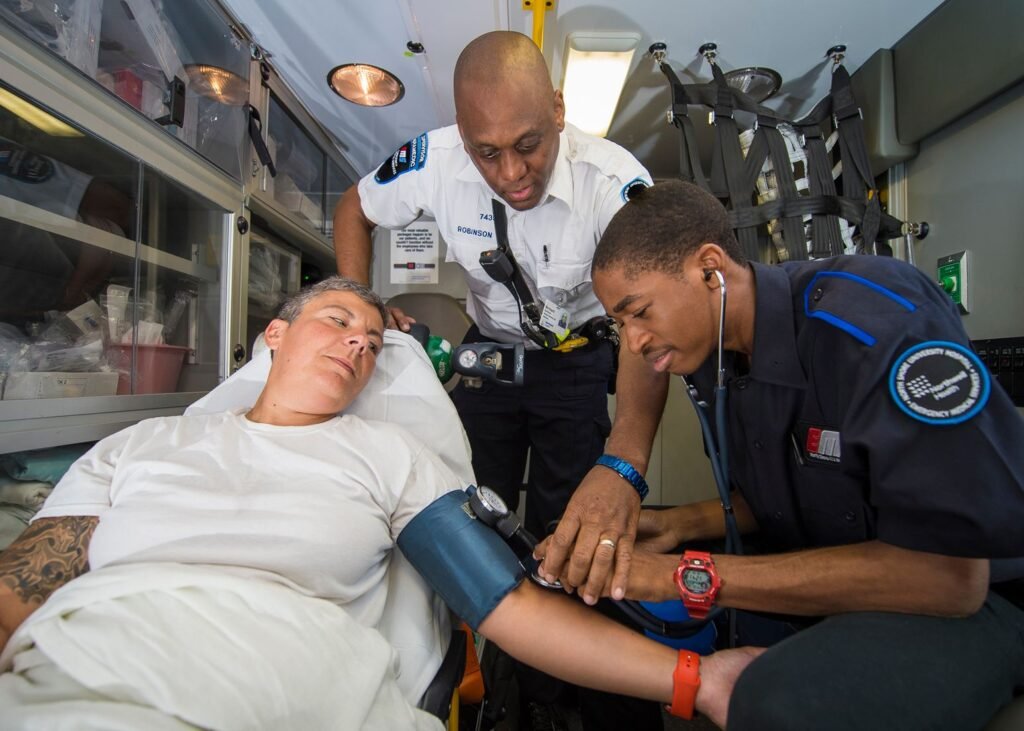Paramedic vs Nurse: Best Career Path for Aspiring Healthcare Professionals
Choosing a career in healthcare can be a difficult decision, especially when considering two vital roles such as a paramedic and a nurse. Both professions play essential parts in patient care, but they differ in their work environments, educational requirements, and daily responsibilities. By closely examining the qualifications and job responsibilities of each, one can determine which career path may be better suited to their background, interests, and talents.
Paramedics and nurses work in different phases of patient care, with paramedics serving as the first line of defense in emergency situations. They work onsite and are responsible for patients’ care from the emergency scene to the hospital emergency room. On the other hand, nurses are responsible for patients’ care upon their arrival at a medical facility, working closely with doctors and surgeons to develop a treatment plan source.
Considering key factors such as education, salary, and work setting can provide valuable insight into which path might be the best fit. Ultimately, understanding the differences between a paramedic and a nurse will help in making an informed decision when choosing a career in healthcare.
Overview of Paramedic and Nursing Careers
Paramedics and nurses are two essential roles in the healthcare field, both providing patient care in different settings and situations. While they may share some similarities, their responsibilities, qualifications, and work environments differ significantly.
Paramedics primarily provide pre-hospital emergency care, responding to medical emergencies such as accidents, heart attacks, or other critical situations. They are trained to assess and stabilize the patient’s condition and transport them to a healthcare facility if necessary. Paramedics typically spend around 23 months in training, and their primary focus is on providing immediate life-saving interventions.
In contrast, nurses have a broader scope of practice and are involved in various healthcare settings, including hospitals, clinics, nursing homes, and more. Nursing training typically takes 2-4 years to complete, depending on the nursing degree pursued, which provides a deeper understanding of patient care and management. Nurses often have more responsibilities and higher average annual salaries compared to paramedics.
To further illustrate the differences between paramedics and nurses, a comparative table is provided below:
| Paramedic | Nurse | |
|---|---|---|
| Training | Approximately 23 months | 2-4 years depending on the degree |
| Setting | Pre-hospital and emergencies | Various healthcare settings |
| Scope | Immediate life-saving interventions | Broader patient care and management |
| Salary | Typically lower | Higher average annual salary |
Ultimately, the decision to pursue a paramedic or nursing career depends on several factors, such as personal interests, professional goals, and working environments. Those who prefer a fast-paced, emergency-focused role may be more inclined to pursue a paramedic career, whereas those who appreciate a more varied and comprehensive patient-care approach might choose to become a nurse. Each profession has unique rewards and challenges, contributing to the diverse landscape of healthcare careers.
Education Requirements
Paramedic Educational Path
Paramedics typically start their education journey with an Emergency Medical Technician (EMT) certificate program. This program takes around 6 months to complete and serves as the foundation for further training. After completing the EMT program, aspiring paramedics enter a two-year associate’s degree program, focusing on advanced life support skills, anatomy, and physiology. In total, a paramedic’s education takes approximately 23 months to complete.
Here’s a brief outline of a Paramedic’s educational path:
- EMT Certificate Program (6 months)
- Associate’s Degree (2 years)
Nursing Educational Path
Nursing education programs offer more variety compared to paramedic programs. Prospective nurses can choose between the following pathways:
- Diploma in Nursing: This program takes about two to three years to complete and is often offered by community colleges or hospital-based schools.
- Associate’s Degree in Nursing (ADN): This program requires two years of study at a community college.
- Bachelor of Science in Nursing (BSN): This is a four-year program, typically offered by universities, and is required for those who wish to become a Registered Nurse (RN).
It’s worth noting that there are accelerated programs for both ADN and BSN degrees, aimed at individuals with a previous bachelor’s degree in another field.
Nursing Educational Path Options:
- Diploma in Nursing (2-3 years)
- ADN (2 years)
- BSN (4 years)
After completing their education, aspiring nurses need to pass the National Council Licensure Examination for Registered Nurses (NCLEX-RN) to obtain their nursing license.
Scope of Practice
Paramedic Clinical Responsibilities
Paramedics are usually the first responders in emergency situations and hence have different responsibilities compared to nurses. Their roles primarily focus on providing pre-hospital and emergency care to patients. Some common tasks that paramedics handle include:
- Assessing patients, identifying the medical emergency, and administering appropriate treatment
- Performing advanced life support (ALS) skills, such as intubation, defibrillation, and administering medications
- Stabilizing and immobilizing patients for transport
- Communicating with healthcare professionals, hospital staff, and family members
- Maintaining equipment and vehicles, as well as ensuring proper documentation of patient care records
Nursing Clinical Responsibilities
Nurses, on the other hand, work in healthcare facilities and collaborate with doctors and other healthcare professionals. Their clinical responsibilities tend to cover a broader range of patient care tasks and they provide care from the moment a patient arrives at a medical facility until they are discharged. Some common tasks for nurses include:
- Monitoring and recording vital signs, as well as updating and maintaining patient records
- Administering medications, injections, and IV therapy
- Assisting physicians with diagnostic tests and procedures
- Providing emotional support and education to patients and their families
- Developing, implementing, and evaluating individualized care plans for patients
While both paramedics and nurses play vital roles in patient care, their clinical responsibilities differ in terms of the settings in which they work and the scope of their practice.
Work Environment
Paramedic Work Settings
Paramedics primarily work in emergency medical services (EMS) and respond to emergency calls, providing medical care to patients at the scene and during transport to the hospital. They typically work outdoors and in various settings, such as urban, rural, or remote areas. Paramedics usually work long hours, with irregular shifts including nights, weekends, and holidays.
- Ambulance Services: Paramedics often work for ambulance companies, whether private, public, or governmental organizations.
- Fire Departments: Many paramedics are employed by local fire departments, functioning as both firefighters and emergency medical personnel.
- Air Ambulance Services: In some cases, paramedics work in air ambulance services, where they provide care to patients being transported by helicopter.
Nurse Work Settings
Registered Nurses (RNs) have more options for work settings compared to paramedics. They can work in various healthcare settings like hospitals, clinics, and nursing homes, as well as educational or government institutions. The work environment is usually indoors, and while the hours could be long and include irregular shifts, they typically have better access to facilities and comforts than paramedics.
- Hospitals: Nurses work in various departments within hospitals, including emergency rooms, intensive care units, and surgical centers.
- Clinics and Doctor’s Offices: Nurses play a crucial role in the daily operations of clinics, collaborating with doctors and other healthcare professionals to provide patient care.
- Home Healthcare: Some nurses provide in-home care to patients, administering treatments, monitoring progress, and offering support to families.
- Nursing Homes and Long-Term Care Facilities: Nurses working in these settings care for elderly and disabled patients, ensuring their well-being and quality of life.
Overall, the work environment for paramedics and nurses can be quite different, with paramedics experiencing more challenges due to the nature of their duties and work settings. On the other hand, nurses have a wider range of settings to choose from and may have an easier time finding a work environment that suits their preferences and needs.
Certification and Licensure

When comparing the careers of paramedics and nurses, it’s essential to understand the certification and licensure requirements for each. Both careers necessitate a BLS-CPR certification and a valid license from their respective states to practice, though the processes differ1.
Paramedics require about 23 months of training, including classroom instruction and hands-on practice2. After completing their training, aspiring paramedics must pass the National Registry of Emergency Medical Technicians (NREMT) certification exam to obtain their license3.
Nurses, on the other hand, typically spend 2 to 4 years earning their degrees in either an Associate’s or Bachelor’s program2. Upon completing their education, nursing graduates must pass the National Council Licensure Examination for Registered Nurses (NCLEX-RN) to earn their Registered Nurse license4. Some nurses may choose to continue their education to become specialized in specific areas or advance to higher positions such as nurse anesthetists or nurse practitioners5.
Below is a table comparing the certification and licensure requirements of paramedics and nurses.
| Profession | Required Training | Certification Exam | License |
|---|---|---|---|
| Paramedic | ~23 months | NREMT Exam | Licensed through state or respective regions3 |
| Nurse | 2-4 years (ADN or BSN) | NCLEX-RN Exam | Registered Nurse License through state; optional specialized certifications available4 |
In conclusion, while both paramedics and nurses must go through certification and licensure processes, the duration and extent of required education and training differ between the professions. Each profession has unique benefits, opportunities, and challenges that should be carefully considered when choosing between a career as a paramedic or a nurse5.
Footnotes
- Registered Nurse vs. Paramedic: What’s the Difference? ↩
- Paramedic vs Nurse: Which Career is Best for You? ↩ ↩2
- Paramedic Training Spot ↩ ↩2
- Comprehensive Guide Paramedic vs Nurse ↩ ↩2
- Weighing the Differences Between Paramedic vs. Nurse ↩ ↩2
Career Advancement Opportunities
Advancement in Paramedicine
Paramedics have various opportunities for career advancement. They can acquire additional certifications, such as Advanced Cardiac Life Support (ACLS) or Pediatric Advanced Life Support (PALS). These certifications allow paramedics to expand their skills and help them qualify for more specialized roles, such as critical care or flight paramedics source.
Another option for paramedics is pursuing promotions within their organizations. This often involves obtaining a higher rank, such as Paramedic Supervisor or Paramedic Operations Manager. These positions may come with increased responsibilities, such as management, training, and administration.
Advancement in Nursing
Nurses also have an array of career advancement possibilities. One route is by earning advanced degrees, such as a Master’s in Nursing (MSN) or Doctor of Nursing Practice (DNP), which opens doors to higher-level positions, including nurse practitioner, clinical nurse specialist, or nurse educator source.
Nurses can also specialize in various fields, such as:
- Oncology: cancer care
- Pediatrics: care of children and adolescents
- Critical Care: care of critically ill patients
- Psychiatric: mental health care
Acquiring certification in these areas helps nurses demonstrate their expertise and pursue career advancement opportunities within their chosen specialty.
In summary, both paramedics and nurses have several paths for career growth, from acquiring additional certifications to pursuing higher education. These progression options allow both professions to increase their knowledge and enhance their respective roles within the healthcare sector.
Salary and Job Outlook

Paramedic Salary and Outlook
Paramedics typically earn an average salary of $45,000, making around 20% more than EMTs. Their pay may vary depending on factors like location, experience, and employer. Here are some key points regarding paramedic salary and outlook:
- Median pay (2022): $45,000
- Highest 10% earned: over $60,000
- Lowest 10% earned: less than $32,000
Job demand for paramedics is projected to grow at a steady rate, mostly driven by the aging population and increased demand for emergency medical services.
Nurse Salary and Outlook
Registered nurses (RNs) generally have a higher average salary than paramedics, with an average salary of $81,000. Here’s a breakdown of registered nurse salaries:
- Median pay (2022): $81,000
- Highest 10% earned: over $110,000
- Lowest 10% earned: less than $58,000
The job outlook for registered nurses is also favorable, with a significant demand for nursing professionals in various healthcare settings such as hospitals, nursing homes, and outpatient care facilities. This demand is influenced by factors like an aging population and advancements in healthcare technology.
In summary, both paramedics and registered nurses have important roles in healthcare, but their salaries and job outlooks differ. When considering a career in either field, it’s important to weigh the differences in education, work setting, and income to determine which path best aligns with your goals and priorities.
Work-Life Balance
When comparing the careers of a paramedic and a nurse, work-life balance is an important factor to consider.
Paramedics primarily work in emergency medical services (EMS), which often require them to be on-call and work irregular hours, including nights, weekends, and holidays. Shifts can be long, sometimes 12 to 24 hours, and highly unpredictable due to the nature of emergencies. This can impact the work-life balance of paramedics, making it challenging for them to maintain consistent schedules outside of work.
On the other hand, nurses have a wider array of work settings to choose from, such as hospitals, outpatient clinics, long-term care facilities, and more. While some nursing positions also entail irregular working hours, there are opportunities with more predictable schedules, depending on the chosen work setting. Nurses in outpatient clinics, for example, typically work during regular business hours.
Here’s a brief comparison of work-life balance factors between paramedics and nurses:
| Factor | Paramedic | Nurse |
|---|---|---|
| Shift length | 12 to 24 hours | 8 to 12 hours |
| Work settings | Limited (mostly EMS) | Diverse (hospitals, clinics, etc.) |
| Scheduling | Irregular (on-call, nights, weekends) | Varies (regular business hours possible) |
Another aspect to consider is the level of responsibility and stress that each profession entails. Paramedics often face high-pressure situations and make rapid decisions that can have life-or-death consequences. While nurses may also encounter critical situations, their scope of practice generally involves a more diverse set of responsibilities, with opportunities to work in less demanding environments.
In summary, the work-life balance for each profession varies, depending on the chosen work setting and individual priorities. Paramedics often have irregular schedules and may face more high-pressure situations, while nurses have a wider range of work settings and schedules to choose from.
Job Satisfaction and Challenges

Paramedic Perspective
Paramedics often face unique challenges in their line of work. They are primarily responsible for providing emergency care in pre-hospital settings such as accidents, emergencies, or medical events occurring outside hospitals. Working in demanding conditions is common, as well as handling emotionally charged and high-stress environments. Frequent exposure to trauma and the need to make quick decisions can contribute to job-related stress among paramedics.
However, it’s essential to note that many paramedics find their job gratifying, as it allows them to make a direct impact on people’s lives. Saving lives, stabilizing patients, and providing critical care in emergencies are some of the key aspects that make this job fulfilling. Additionally, the opportunity for career growth, expanded skill sets, and the chance to collaborate with other professionals in the healthcare field can bring satisfaction for paramedics.
Nursing Perspective
Nurses, on the other hand, work in more diverse environments, such as hospitals, clinics, nursing homes, schools, and other healthcare facilities. They have a wider range of responsibilities compared to paramedics, including patient care, medical recordkeeping, and collaboration with other healthcare providers. This variety, along with closer relationships with patients, can contribute to a greater sense of job satisfaction for nurses.
However, there are challenges within nursing as well. Nurses may experience long hours, rotating shifts, and increased workloads at times. Potential exposure to workplace hazards, potential conflict with patients and families, and emotional challenges due to ongoing patient care can also be sources of stress.
In comparison, both paramedics and nurses play crucial roles in delivering healthcare services. While paramedics focus on pre-hospital emergency care, nurses have a broader scope in various settings. Ultimately, each profession’s satisfaction and challenges will depend on one’s personal interests, aspirations, and aptitude for handling adverse situations.
Community Impact and Social Considerations

When comparing the careers of a paramedic and a nurse, it is essential to consider their community impact and social considerations. These factors may help determine which career may be more suitable for an individual based on their interests and passion for making a difference in people’s lives.
Paramedics play a critical role in providing emergency care to patients, usually in their homes or at the scene of accidents, before transporting them to hospitals for further treatment. They are often the first responders in life-threatening situations, making split-second decisions that may save lives. Their work is highly visible in the community, and they interact with a diverse range of people in various emergency situations. An emerging field in paramedicine is community paramedicine, which focuses on providing non-emergent and preventive health services tailored to local needs.
Nurses, on the other hand, work predominantly in healthcare facilities such as hospitals, clinics, and nursing homes. They provide a wider range of care services, including administering medication, monitoring vital signs, educating patients, and coordinating with other healthcare professionals. Nurses may specialize in various fields, like pediatrics, oncology, or critical care, allowing them to make a significant impact on specific patient populations. They also serve as patient advocates and contribute to the overall wellbeing and recovery process.
Other Nurse vs Paramedic Challenges
In terms of social prestige, both professions are respected for their contributions to public healthcare. However, there is a lack of research on the social image and position of the paramedic profession in the social structure. Nurses are often seen as holding a higher level of respect due to licensure, education, and career advancement opportunities, which may lead to higher salary opportunities.
In summary, paramedics and nurses both make significant impacts on their communities, but their roles differ concerning working environments, emergency response versus continuous care, and career advancement opportunities. Individuals considering these professions should weigh these factors alongside their interests and abilities.
Making the Decision: Paramedic or Nurse?
When choosing between a career as a paramedic or a nurse, there are several factors one needs to consider. The two professions have different educational requirements, work environments, and daily responsibilities. Comparing these factors can help someone determine which path aligns best with their skills, interests, and goals.
Educational Requirements
Paramedics typically complete 1-2 years of training, including EMT and paramedic courses. They may opt for additional education, such as a four-year degree, but it isn’t a requirement.
Nurses require 2-4 years of education, with a four-year degree required for registered nurses. They can pursue further education to specialize in specific nursing fields.
Work Environment and Responsibilities
Paramedics mainly work in emergency situations and pre-hospital settings. They provide on-site care, stabilize patients, and transport them to hospitals when needed. While paramedics function as the first line of defense, their scope of practice is more limited, and they often work in high-stress situations.
Nurses, on the other hand, generally work within hospitals or clinics. They are responsible for the ongoing care and management of patients. Their scope of practice can be broader, depending on their specialization. Nurses must be adaptable and able to work in various settings, such as emergency rooms, surgical units, and outpatient clinics.
Salaries and Job Prospects
Registered nurses generally earn higher salaries than paramedics, with an estimated salary difference of $33,000/year. Job opportunities may also be more varied for nurses as they have the option to specialize in different medical fields.
In summary, the decision between becoming a paramedic or a nurse depends on personal preferences, abilities, and goals. Consider the educational requirements, work environment, responsibilities, and earning potential when making your choice.
Frequently Asked Questions
What are the differences in salary between paramedics and nurses?
The salaries of paramedics and nurses typically differ, with nurses generally earning more than paramedics. According to the Indeed Editorial Team, registered nurses have a higher average salary than paramedics. However, salaries can vary based on factors such as experience, geographical location, and the specific healthcare setting.
Which requires more education, becoming a paramedic or a nurse?
Becoming a nurse requires more education compared to becoming a paramedic. Paramedics complete training programs that can last from 6 months to 2 years, depending on the level of certification. Nurses, on the other hand, need to complete a 2-year associate degree or a 4-year bachelor’s degree in nursing to become a registered nurse. Some nurses also pursue higher degrees like Master’s and Doctorate degrees to specialize in various fields of nursing (NurseJournal.org).
What are the long-term career prospects for paramedics versus nurses?
Long-term career prospects for both paramedics and nurses can be promising, but nurses generally have a wider array of opportunities due to their broader scope of practice. Nurses can specialize in different areas like pediatrics, oncology, or intensive care, as well as advance their careers to become nurse practitioners or nurse educators. Paramedics, while having opportunities to advance within Emergency Medical Services (EMS) hierarchy, are more limited in their career progression compared to nurses (Paramedic Training Spot).
In terms of job responsibilities, how do paramedics and nurses differ?
Job responsibilities for paramedics and nurses differ mainly in the settings in which they work. Paramedics respond to emergency situations outside the hospital and provide pre-hospital care, including assessing patients’ conditions, stabilizing vitals, and administering medications. Nurses work in various healthcare settings like hospitals, clinics, and nursing homes, providing care for patients with a wide range of medical needs, assisting with medical procedures, and monitoring patients’ conditions and progress in their treatment (Incredible Health).
What are the main factors to consider when choosing between a career as a paramedic or a nurse?
When choosing between a career as a paramedic or a nurse, one should consider factors like personal interests, desired work environments, educational requirements, and long-term career goals. Paramedics work in high-stress, fast-paced environments and must be able to handle emergency situations. Nurses often work in more stable settings and have opportunities to advance in their careers and specialize in various fields. Another essential factor to consider is the salary potential and job outlook in the healthcare industry for both professions (RN Careers).
How does the work environment of paramedics compare to that of nurses?
Paramedics primarily work in emergency medical settings outside the hospital, such as at the scene of an accident or during a medical emergency at home. They often work in unpredictable and high-stress environments. Nurses, on the other hand, usually work in hospitals, clinics, and nursing homes, where they interact with patients, families, and other healthcare providers in a more structured and controlled environment. The work environment of paramedics tends to be more physically demanding and mentally challenging compared to that of nurses, due to the nature of emergency situations and the need for quick decision-making (Indeed)).









[…] this preparation, I also familiarize myself with the multidisciplinary team members I’ll be working with. This team typically includes surgeons, physicians, specialists, […]